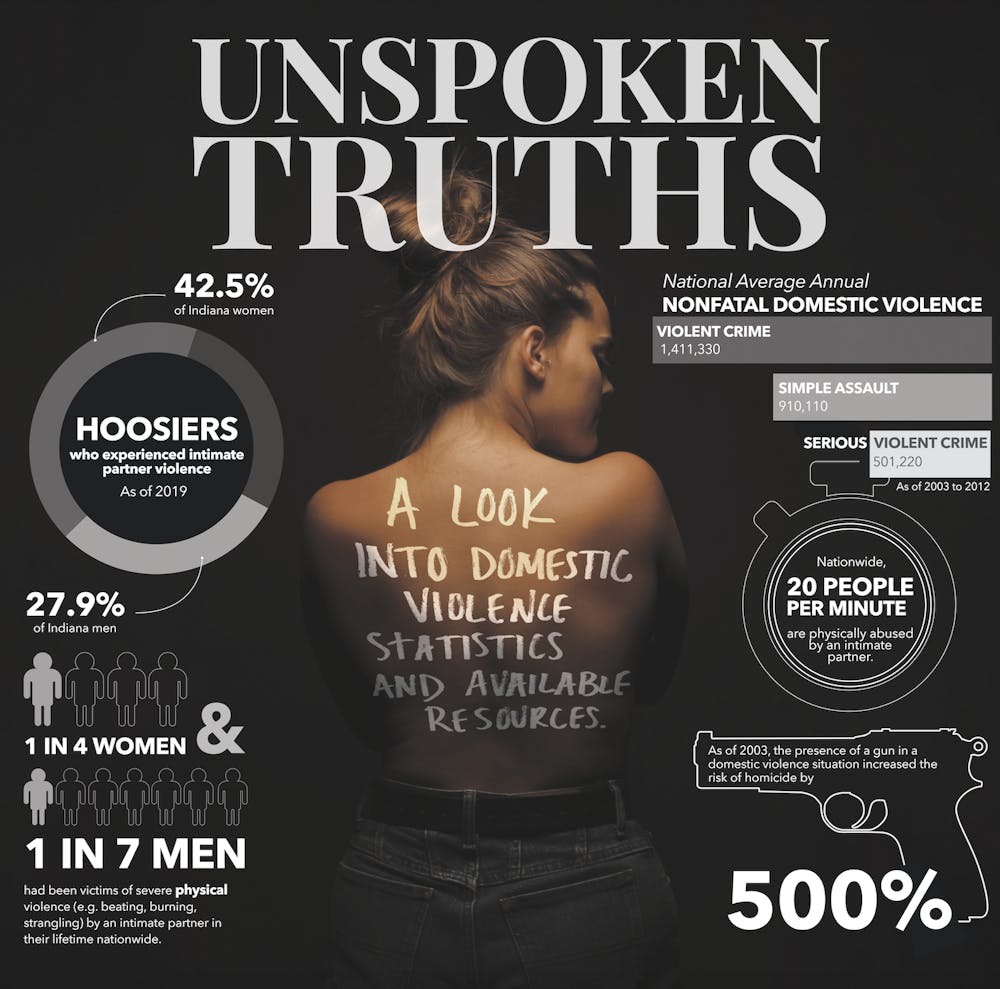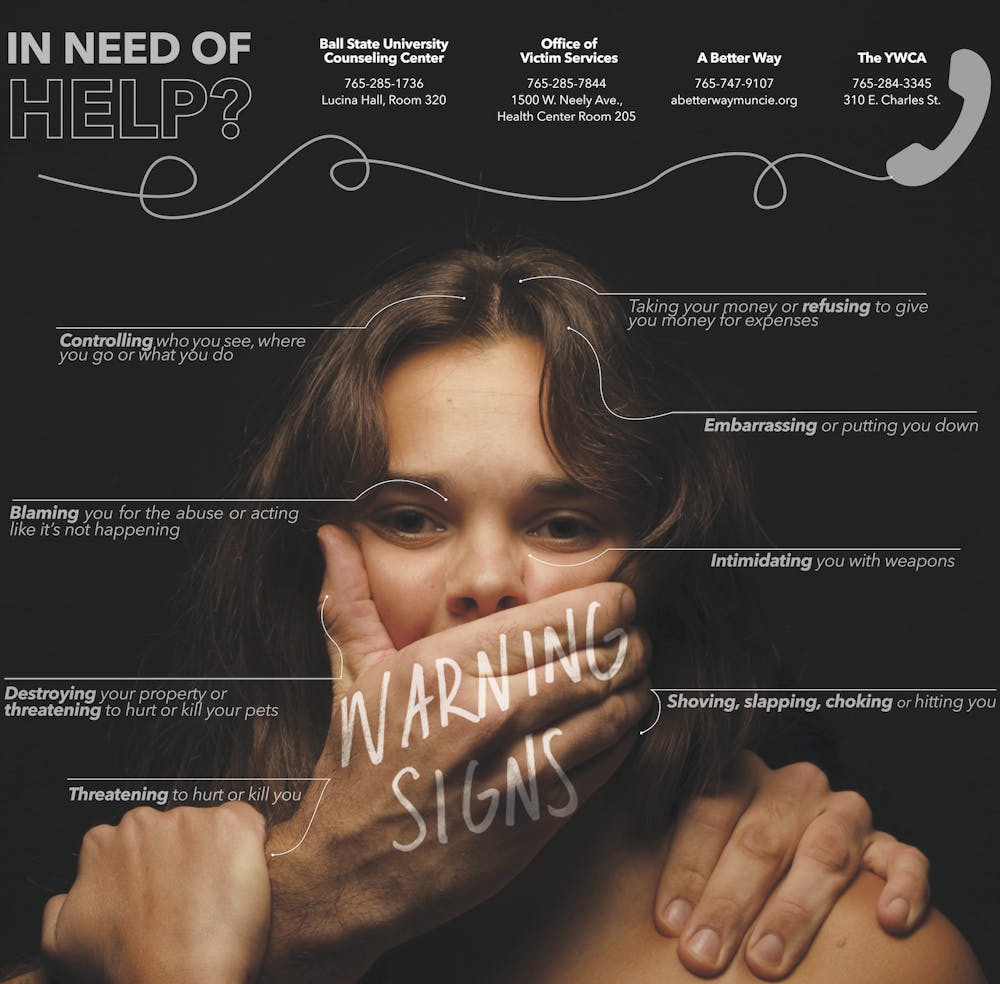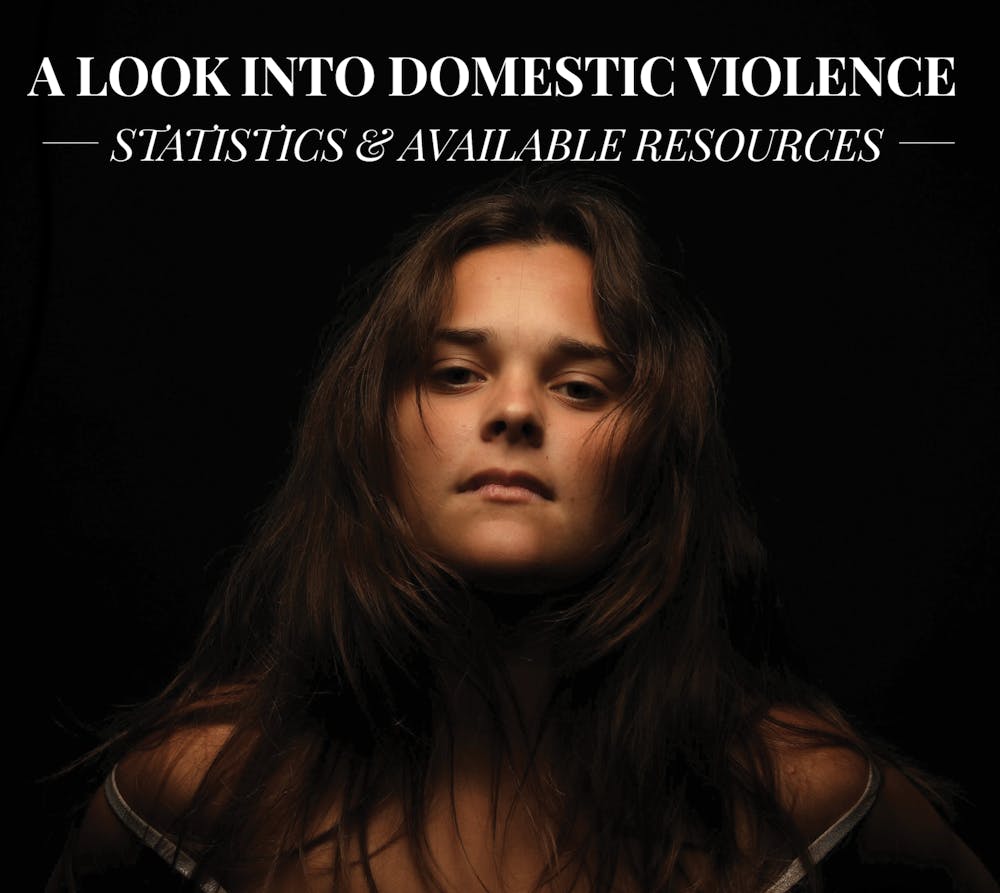Content Warning: This story contains detailed descriptions and images related to domestic violence that may be triggering to some readers. Please read with caution.
According to the National Coalition Against Domestic Violence, “domestic violence is the willful intimidation, physical assault, battery, sexual assault and/or other abusive behavior as part of a systematic pattern of power and control perpetrated by one intimate partner against another. It includes physical violence, sexual violence, threats and emotional abuse. The frequency and severity of domestic violence can vary dramatically.”
Domestic violence can happen to anyone of any age and includes intimate partner violence, as well as violent crimes in domestic settings against children, parents or the elderly. Survivors can develop physical disabilities and psychological disorders as a result of domestic abuse.
October is Domestic Violence Awareness Month, and the Ball State University Office of Victim Services (OVS) provides resources and support to students who have been affected by any form of domestic violence.
Anna McGee works as the Ball State victim advocate. McGee has been part of OVS since February 2019, which she said provides resources for those affected by domestic violence.
Domestic Violence Warning Signs
Although domestic violence can manifest in many ways, McGee said a few specific examples include physical abuse, preventing someone from seeing friends or family and threatening to harm them.
Here are some other examples of warning signs people can pick up on:
Embarrassing or putting you down
Looking at you or acting in ways that scare you
Controlling who you see, where you go or what you do
Keeping you from or discouraging you from seeing your friends or families
Taking your money or refusing to give you money for expenses
Preventing you from making your own decisions
Telling you that you are a bad parent or threatening to harm or take away your children
Preventing you from working or attending school
Blaming you for the abuse or acting like it’s not really happening
Destroying your property or threatening to hurt or kill your pets
Intimidating you with guns, knives or other weapons
Shoving, slapping, choking or hitting you
Attempting to stop you from pressing charges
Threatening to commit suicide because of something you’ve done
Threatening to hurt or kill you
Pressuring you to have sex when you don’t want to or do things sexually you’re not comfortable with
Pressuring you to use drugs or alcohol
-
Preventing you from using birth control or pressuring you to become pregnant when you’re not ready

Rylan Capper, DN Photo Illustration; Kamryn Tomlinson, DN Design
Office of Victim Services 765-285-7844 1500 W. Neely Ave, Health Center Room 205
The Office of Victim Services supports survivors of dating or domestic violence, stalking and sexual assault. McGee helps those affected by working with them through the reporting process, attending prosecutor meetings and trial processes and referring them to other campus resources. If needed, McGee will also help students file a protective order through the state of Indiana.
If a victim does not want to report their experience to law enforcement, they can still contact the Office of Victim Services for academic assistance, counseling, a protective or no-contact order, emotional support and health services. Students do not have to report their experiences to law enforcement, but they can still report to Title IX, and there will be campus repercussions for the respondent.
Ball State University Counseling Center 765-285-1736 Lucina Hall, Room 320
The Ball State Counseling Center provides 24/7 resources for students struggling with mental health and is one of the many resources available to those affected by domestic violence. Because of Ball State’s indoor mask mandate, most therapy appointments will still be conducted virtually, but in-person therapy is offered for specific situations. The Counseling Center also gives presentations on various mental health topics, such as anxiety, depression and eating disorders.
Health Center 765-285-8431 1500 W. Neely Ave.
The Ball State Health Center is made up of a main clinic, pharmacy, women’s center, health education center and a physical therapy unit. The Health Center is where McGee’s office is located, and she can give verbal referrals to the Health Center for students impacted by domestic violence, which can either be telling a student where a resource is or having a three-way phone call with the student and the resource. The Ball State Employee QuickClinic is located on the lower level of the building and provides Ball State employees with on-campus treatment.
A Better Way 765-747-9107 abetterwaymuncie.org
A Better Way has been serving those affected by domestic violence in the Muncie area since 1977. Some of their services include a temporary shelter, support groups, transitional housing and a walk-in rape crisis center, which provides victims of rape or sexual assault with resources such as on-site crisis counseling, legal advocacy and sexual assault education.
Local Resources
A Better Way provides:
A safe shelter for domestic violence and sexual assault survivors and their children for up to 45 days
Essential transportation for residential clients to work, court, school and other activities
Educational resources including support groups, counseling and other programs
Financial independence education for assault survivors
A rape crisis center providing counseling, safety planning, legal advocacy and emotional support
Children’s programs and parenting classes
Telecare services including daily calls to older, disabled or homebound adults
A suicide hotline and crisis hotline
Suicide hotline: 800-273-TALK
24-hour crisis line: 765-288-HELP
A Better Way can be reached at its office phone number: 765-747-9107. To become a volunteer for A Better Way’s crisis hotline, apply online at abetterwaymuncie.org.
The YWCA provides:
Complimentary, overnight, temporary shelter stay program
Emergency shelter for women and children for up to 45 days
Permanent housing support and advocacy
Social justice and civil rights education programs
Leadership and development opportunities for young women and girls
Health and wellness programs and increased access to public healthcare
The YWCA can be reached at its 310 E. Charles St. location or at its office phone number: 765-284-3345.

Rylan Capper, DN Photo Illustration; Kamryn Tomlinson, DN Design
National Resources
The National Domestic Violence Hotline
800-799-7233 (SAFE)
National Dating Abuse Helpline
866-331-9474
National Child Abuse Hotline/Childhelp
800-4-A-CHILD (800-422-4453)
National Sexual Assault Hotline
800-656-4673 (HOPE)
National Suicide Prevention Lifeline
800-273-8255 (TALK)
www.suicidepreventionlifeline.org
National Resource Center on Domestic Violence
800-537-2238
www.nrcdv.org and www.vawnet.org
National Center on Domestic Violence, Trauma & Mental Health
312-726-7020 ext. 2011
www.nationalcenterdvtraumamh.org
Sources: A Better Way Muncie, Central Indiana YWCA, National Coalition Against Domestic Violence, Ball State victim advocate Anna McGee, Bureau of Justice Statistics and National Crime Victimization Survey





